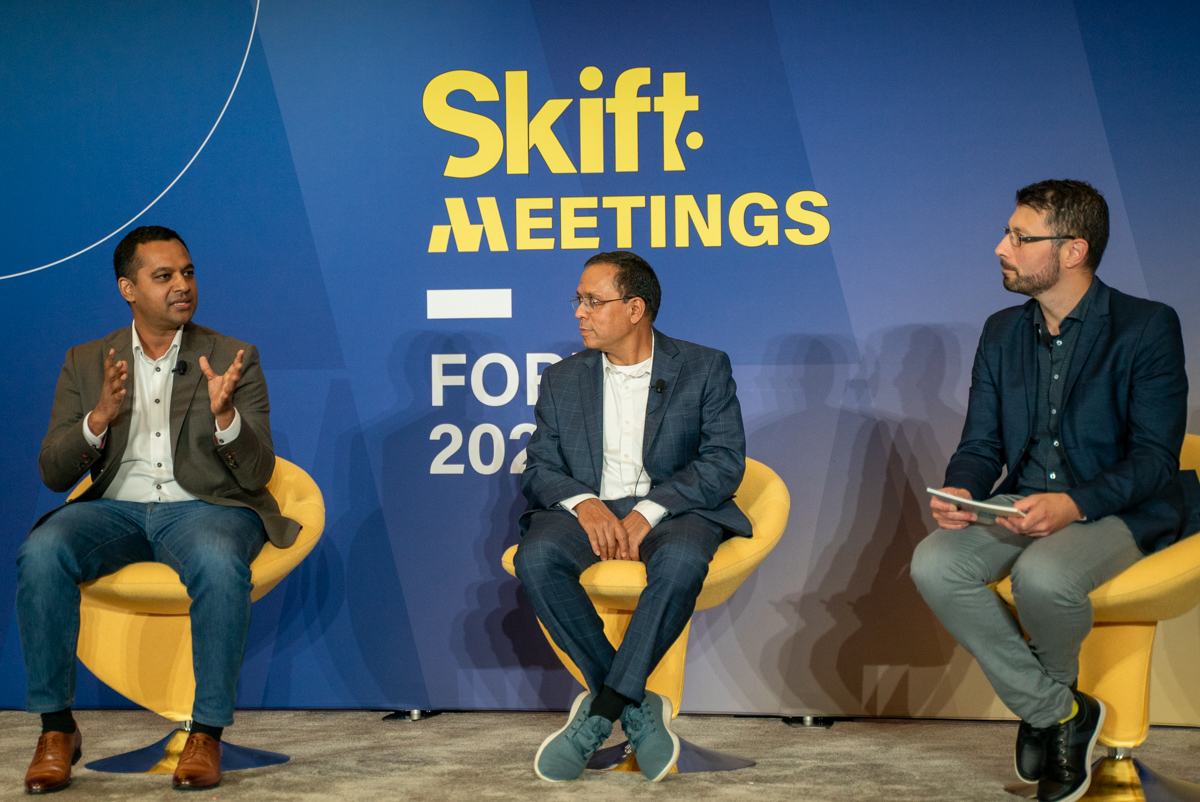Skift Take
AI-powered event technology is here to stay, but planners must embrace it to leverage all its inclusivity and productivity-boosting potential.
Wordly CEO Laksham Rathnam and Gevme CEO Veemal Gungadin took the stage during the first annual Skift Meetings Forum to discuss the future of artificial intelligence (AI). They discussed how this advanced technology allows planners to streamline event management and elevate the attendee experience.
They discussed how event professionals can leverage these apps to not only provide translations and transcripts of speech but also use the technology to analyze text, such as legal documents. Today’s tools can quickly analyze any text and give valuable, specific feedback.
Enhanced Voice Translation
The AI-powered translation provided through Wordly allows users to utilize a number of functions, including transcription, captions, and live audio translation. Wordly used AI to go beyond recognition-based transcription. It translates speech within the logical syntax of a language and successfully conveys context to the audience.
“AI translation is typically done word by word, which is great but doesn’t make sense,” Rathnam said, adding that Wordly uses AI to set boundaries for phrases to ensure an accurate translation from a contextual point of view. Rathnam gave the example of the AI used by Wordly to decipher the differences between certain idioms found in American and British English, such as the boot of a car and a boot one would wear, and reorganizing the sentence structure so that it makes sense in other languages.
As Wordly’s AI translation engine is constantly trying to predict the next word or phrase, it can also identify “meaningful chunks.” Rathnam noted these as being used by journalists or event professionals, for creating real-time posts on social media.
Wordly can greatly improve accessibility for attendees. The app can interpret over 30 languages and translate roughly 700 different language pairs in both audio and text. It can also capture session transcripts and create event summaries.
Spotify recently announced a partnership with OpenAI to offer versions of popular podcasts in different languages, emulating the voices of the podcasters and guests featured in the original version. According to Rathnam, a version of this feature – that Spotify calls Voice Translation for podcasters – may soon be available for real-time translation on Wordly.
AI Finetuned for Event Professionals
Gevme, through a partnership with PCMA, built Project Spark, an AI chatbot aimed at assisting event professionals in generating content, brainstorming, and analyzing text. But what sets Project Spark apart from ChapGPT is its focus on the specificity of the events industry.
Gungadin pointed to the new method of AI referred to as the “transformer model,” which he said makes the process of deploying and implementing the technology much cheaper when compared to earlier iterations while making it more efficient overall. The chatbot tool will also ensure the validation of the output, Gungadin said. “One aspect of using AI that I think is going to be very important is to be able to trust the outcome,” he said.
“What we set out to do with Project Spark is to look at this new class of technology and see what we can use it for,” Gungadin said. Project Spark allows event professionals to turn video recordings of sessions into marketing content. It will also analyze speaker panels to identify the issues discussed and extract solutions from the talk itself. Furthermore, it allows planners to analyze feedback to provide sentiment analysis quickly – an often overlooked or outsourced task, according to Gungading.
AI to Empower Humans, Not Replace Them
While the primary concern in regard to generative AI is the replacement of humans and the potential loss of jobs, Laksham and Gungadin are certain that the emerging technology will only empower people and allow them to do more with less time and resources.
Laksham noted the importance of the dataset used by AI for generating an output based on a sound dataset and training models to receive a good result. “My concern is if new information is being added to the dataset, there won’t be any new information, and you’ll keep getting the same old story.” This highlights the importance of the ongoing production of content generated by humans and the potential pitfalls of relying solely on AI to generate content. “So, the need for content is only increasing; it’s not going down.
AI is currently in the early stages of adoption, according to Gungadin, who noted that while larger companies are slower to experiment with newer technologies such as this, AI will empower smaller companies and startups to move quickly in experimenting with newer technologies and the opportunity for disruption.





